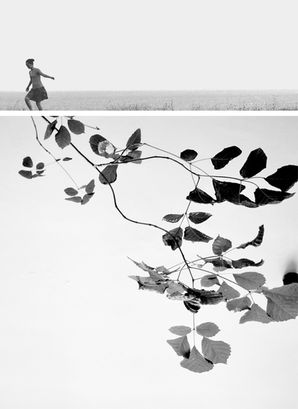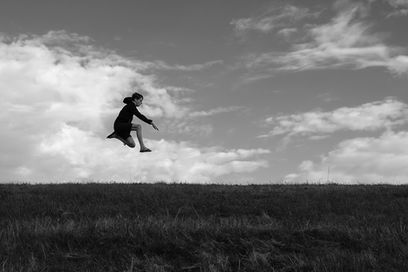
WITH AN OPEN LENS AND HEART
July 2, 2021
INTERVIEW
PHOTOGRAPHY Pavieł Hančar
INTERVIEW Karin Svadlenak
The stunning work of Pavieł Hančar captures the beauty of everyday life in Belarus. With an open lens and heart, he approaches his photography with an unassuming, monochromatic style. He chooses to view the world through the eyes of a beginner, allowing for true moments of revelation to be revealed in his work. Through his breathtaking shots, Pavieł seeks to demonstrate that beauty can often be found in the most unexpected places. His unique approach to photography allows him to capture the spirit and soul of the people he photographs, creating vivid and moving images that will captivate any viewer. With a passion for capturing life’s beauty, Pavieł Hančar is an exceptional documentary and street photographer whose work will remain timeless in its appreciation of the world around us.

“I really appreciate my amateur status in photography - it allows me not to put pressure on myself and not to burn out. Really, nothing bad will happen if I return from a walk without a good shot. An editor will not shout at me, colleagues will not look reproachfully…But it allows me to go shooting as if I am doing it for the first time: without guarantees, without impudence, without prior vision of the results. In this particular state, when you are just a conductor of God's will, not a hunter, in my opinion, you let the best pictures happen. At least, I strongly believe in it.”
IN CONVERSATION WITH PAVIEŁ HANČAR
THE PICTORIAL LIST: Paviel please tell us about yourself. Talk to us about your work and life in Minsk. When and how did you become interested in photography?
PAVIEŁ HANČAR: I was born in the small Belarusian town of Naroulia, on the banks of the Pripyat River, 49 years ago. My family and I now live in a village near Minsk, I work as the executive director of a group of IT companies, and in fact, I do not have much time for photography, but I always carry a camera with me, and it works from time to time. I have been photographing since childhood, and my father, who took our family photos and had a full set of equipment for the "dark room", once instilled interest in me. He gave me my first camera, it was a semi-format "Chajka" with 28mm Industar lens, and I was absolutely fascinated by miniature sharp negatives that I could look at for hours. Many years later, photography came back to my life when I already had a son too. One day, taking a camera with me when leaving home, I made an almost random shot in the building of the former monastery, which now houses a music school. Then for a long time I could not take anything better by form and content. That time, it made me realize what I was interested in and what I was going to do as a photographer. The story happened almost 20 years ago, the frame was not lost, I kept it at the bottom of my Instagram page as a memory.
TPL: You seem quite interested in documenting traditional customs and arts in your country. What is is that you find especially interesting about that?
PH: People. It is there that I meet most of "my" people, loved in Belarus, smart, beautiful, passionate about the common cause. It is my job to take photos of them as best I can, and, hopefully, an atmosphere of folklore festivals is usually conducive to good pictures.
TPL: In general regarding your photography, where do you find your inspiration to create?
PH: As a professional manager I am very sensitive to everything that concerns motivation. So I try not to manipulate and don’t look for inspiration on purpose. I really appreciate my amateur status in photography - it allows me not to put pressure on myself and not to burn out. Really, nothing bad will happen if I return from a walk without a good shot. An editor will not shout at me, colleagues will not look reproachfully… But it allows me to go shooting as if I am doing it for the first time: without guarantees, without impudence, without prior vision of the results. In this particular state, when you are just a conductor of God's will, not a hunter, in my opinion, you let the best pictures happen. At least, I strongly believe in it.
TPL: Do you have a favourite place to photograph?
PH: I do not know what to do with the answer to this question, but the best pictures in the last couple of years I took in Zaslauje - a small town near Minsk. I didn’t analyze why, just so it turned out, it’s a good place with good people.
TPL: Do you have any favourite artists or photographers you would like to share with us, and the reason for their significance?
PH: Yes, I have. I love French humanist photographers, but the most - Edouard Boubat, in whose work I find exactly what touches me, and I feel it closest to my worldview. Yes, he may not be as noble a master of composition as Cartier-Bresson, not the author of hundreds of iconic street photos like Doisneau, but I really like the modest poetics and tenderness in his shots. And, like him, I realize I am "a kind street photographer". I do not need a frame for which I would need to insult a person or expose him in a bad world. Really, don't.
I am definitely a 50mm person, I have this “frame” in my mind when I look around without a camera.

TPL: When you take pictures, do you usually have a concept in mind of what you want to shoot, or do you let the images just "come to you", or is it both? Please describe your process.
PH: Definitely, the second way. Yes, I can choose the best location, the right light, the most interesting characters, but none of that guarantees a great shot as a result. Professional one - yes, usually it does. But really great shots are the gifts. And if you are worthy of the gift, you will receive it. It may seem like an ineffective strategy, but in real life - on the contrary, the most beautiful shots are brought by such an approach.
TPL: Does the equipment you use help you in achieving your vision in your photography? What camera do you use? Do you have a preferred lens/focal length?
PH: Yes, I need restrictions for not thinking about equipment. I lived for 10 years with a Rolleiflex 2.8F, and it was enough for everything I did. Now the same role is played by Leica Monochrom. I'm sure I'll take "my" shots with this camera, I'm pleased to have it with me every day, and I know that I will be happy with the result. As for the lens, it is always a painful topic to choose: 50 or 35mm. Despite the greater versatility of the second, I am definitely a 50mm person, I have this “frame” in my mind when I look around without a camera. And as for resulting prints, I prefer the natural perspective of 50mm, they can be entered by sight as if in a window. I don’t get the same feeling from wide-angle shots.
TPL: What are some of your goals as an artist or photographer? Where do you hope to see yourself in five years?
PH: There, on a walk, a grateful observer, or a grandfather who photographs his first grandchildren. Hopefully a happy guy in both guises.
TPL: Are there any special projects you are currently working on that you would like to let everyone know about?
PH: Yes, I recently joined an interesting ethnographic project as a volunteer. The project is called Shtetlfest and is dedicated to finding the remains of Yiddish culture in Belarusian, Ukrainian and Polish towns. This is what I used to see in my childhood, and what makes Belarus distinctive, whose people have always been famous for their tolerance of different cultures. Hope this will be an interesting experience. Maybe good shots will be too.
TPL: “When I am not out photographing, I (like to)…
PH: Read. Contemporary fiction in the Belarusian language is my second passion after photography. You may have heard how miserable the state of my Belarusian language is in Belarus after more than 200 years of planned Russification, which is still going on by the ruling regime for certain economic benefits. I try to support the publication of books in the Belarusian language, participate in crowdfunding, and above all, I am a grateful reader for Belarusian authors. Literature that is born from your life, in which there is a pulse of events that excite you, is much sharper and more interesting than a classic, no matter how good it is. Practically like photography!”




































